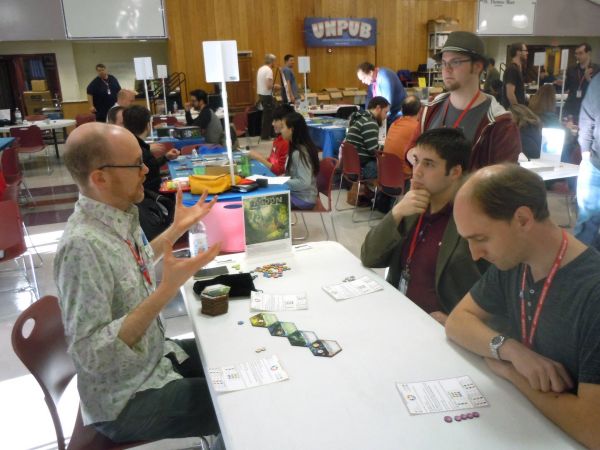Unpub4 and Some Casual Games in the Works

Unpub4 gave attendees the opportunity to playtest unpublished game prototypes with 52 different designers. Several publishers were also in attendance, and some signing announcements are already coming out following that weekend. Among all those great prototypes, I saw several that squarely fit the CGR definition of “casual game”, so let me share just a few of the casual gems that I personally had the pleasure to play over the weekend.
Sheep! by David Wallin – Think of the children’s game Dots where you take turn drawing line segments on a grid and try to complete the most squares. But in this case the rectangles are fields, that field can be as big as you want as long as it is completely enclosed, and instead of writing your initial, you mark that field with one of your sheep. An easily-taught deck building mechanic offers players increasingly beneficial cards to earn larger fence sections and/or extra sheep every turn. At the end of the game, the score for each of your fields is the area (squares) of that field multiplied by the number of sheep in it, with a bonus for any field that is fully occupied. This was a very fun game that only took 30 minutes to play.
The Game of 49 by Mark Corsey – Another very fun game, this one played on a 7x7 grid numbered 1-49. All you have to do is claim four-in-a-row to win. Easy, right? But what if you were given $49, you had to buy the space where you want to place your marker, and all the other players could try to outbid you for that same space? What you end up with is a tense game of careful cash management as other players try to drive up the price you must pay for the spaces you really need. A card deck determines which space is next on the auction block, with some occasional wild spaces and cash payouts ($7 per chip you have on the board, with a $49 maximum) to replenish your wallet.
Monster City Planners by Gary Dahl – Actually, I didn’t play a full game, as my wife came to take my place (and she won) when I had to return to my table to teach one of my prototypes. But Gary taught it to me at Congress of Gamers last fall, so I am able to talk about it. This is a microgame played on a small 5x4 grid. Each space can hold 1 of 3 building types, while roads occupy 2 spaces. Players draft a hand of six cards. Each card has a top half that allows you to add, remove, or move something on the board, while the bottom half is a score condition (i.e. earn 2 points for each white factory adjacent to an orange station). This is a very interesting game as players try to manipulate the board to match the scoring conditions in their hand. The dual-use cards lead to decisions of which cards to play to change the board vs. which cards to hold to score points at the end of the round.
Suspense by Daniel Solis – I got to play this one before the main event started on Friday evening as designers and publishers returned from their mixer and quickly filled the tables in the hotel’s lounge area. While this game definitely meets the play time and ease-to-teach criteria of CGR’s definition of a casual game, whether it meets the third criteria of light strategic thought is debatable. While it is self-published rather than unpublished, after playing it I must give it a mention. From a design perspective, Suspense is a brilliant example of how a game with very few components (just 13 cards) and only a few simple rules can have incredible strategic depth. Each card has both a number (1-6, either white or black) and a unique victory condition. One card is not dealt and becomes the victory condition for that round. Only the dealer for that round is allowed to look at that card, the other players must play without knowing how to win the round. Their only clues come from watching how the dealer plays the round, and by eliminating from the list of possibilities the victory conditions listed on the cards that have been played. This game will make you think!
I don’t think any designer ever gets to try all the prototypes they want to play at any Unpub event, since time must also go to showing our own prototypes to play testers. In my case, I brought 3 different prototypes that spent playtest time on my table (FireBreak, Attatat, and Lady of the Diamonds). Once again, the weekend was over before I could try all the other games on my list. I was kicking myself afterwards for waiting until it was too late to try to get a demo of Shigami, and that I completely forgot about Don’t Get Eated until I looked over my list again on Monday.
Yet the great thing about Unpub is that there are smaller local Unpub events year round all across the United States. So if you are interested in trying some great games before they are published, keep any eye on the Unpub events page for a time and place near you. Trust me, you won’t be disappointed.
Picture is Dave Chott teaching his unpublished game Lagoon at Unpub4, courtesy of Dr. Wictz’s Boardgames.





That is such a great concept. I like the idea of unpublished indie designers given a forum exclusive to them.